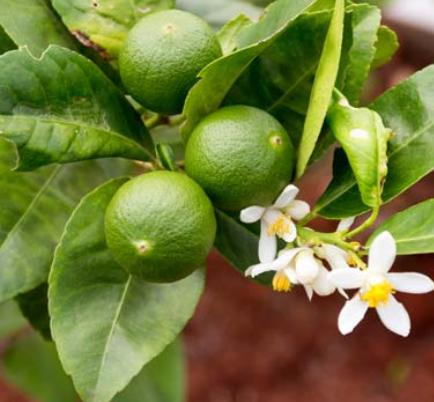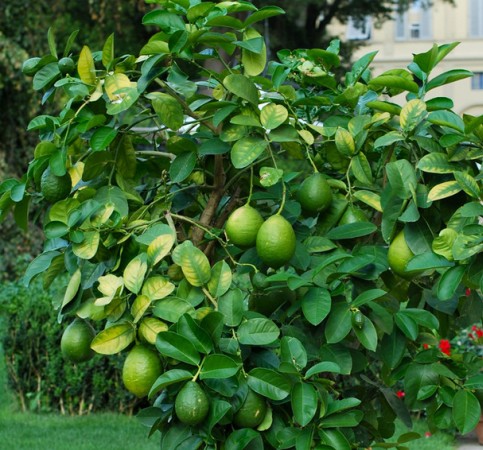-Essential-Oil.png)
-Essential-Oil.png)



Botanical name Citrus latifolia Tanaka
Family Rutaceae
Source Fruit Peel
Origin Brazil
Processing Method Steam Distillation
Color/Consistency A thin, clear, yellowish green to greenish brown liquid.
Aromatic Summary / Note / Strength of Aroma A top note with a medium aroma, it has a tart, fresh scent characteristic of the fruit.
Blends With Bergamot, Cedar Wood, Geranium, Grapefruit, Lavender, Lemon, Mandarin, Neroli, Nutmeg, Orange, Palmarosa, Petitgrain, Rose, Rosemary, Rosewood, Vetiver and Ylang-Ylang.
Product Abstract
Lime is believed to be native of eastern Malaysia and was introduced to the West Indies by Columbus during his second voyage. Lime has historically been used as a digestive aid, along with having many other traditional uses. Today lime is best known throughout the world for its intense and potent aroma and flavour with a multitude of uses in many applications.
History
Although the precise origin is uncertain, wild limes are believed to have first grown in Indonesia or Southeast Asia, and then were transported to the Mediterranean region and north Africa around 1000 CE.
To prevent scurvy during the 19th century, British sailors were issued a daily allowance of citrus, such as lemon, and later switched to lime. The use of citrus was initially a closely guarded military secret, as scurvy was a common scourge of various national navies, and the ability to remain at sea for lengthy periods without contracting the disorder was a huge benefit for the military. The British sailor thus acquired the nickname, "Limey" because of their usage of limes.
Harvesting/Extraction Information
The inadequate management of ‘Tahiti’ acid lime harvesting has led to quality loss and reduced profitability for producers and exporters. This study evaluated the quality and conservation of ‘Tahiti’ acid limes for export using four different harvesting systems. Fruit were harvested with scissors, by twisting, with the help of a metal basket and with a hook.
Common Usage
Caution
This oil has phototoxic properties and exposure to the sun must be avoided after application to the skin. Due to their presence, please consult a physician prior to using this oil. Dilute well before use; for external use only. May cause skin irritation in some individuals; a skin test is recommended prior to use. Contact with eyes should be avoided.
Key constituents
(þ)-Limoneneþ1,8-cineole 55.6%
g-Terpinene 11.8%
a-Terpineol 6.6%
Terpinolene 5.2%
b-Myrcene 2.6%
(Z)-b-Terpineol 2.2%
Terpinen-1-ol 1.9%
a-Pinene 1.8%
b-Pinene 1.8%
1,4-Cineole 1.8%
p-Cymene 1.5%
Terpinen-4-ol 1.3%
a-Fenchol 1.1%
Quality Distilled lime oil may be adulterated with added a-terpineol, terpinolene and other lime terpenes.
Safety summary
Hazards Skin sensitization if oxidized.
Cautions Old or oxidized oils should be avoided.
Our safety advice
Because of its (þ)-limonene content we recommend that oxidation of distilled lime oil is avoided by storage in a dark, airtight container in a refrigerator. The addition of an antioxidant to preparations containing it is recommended.
Regulatory guidelines
Has GRAS status. IFRA recommends that essential oils rich in limonene should only be used when the level of peroxides is kept to the lowest practical level, for instance by adding antioxidants at the time of production.
Organ-specific effects
Adverse skin reactions Undiluted distilled lime oil was slightly irritating to rabbits; tested at 15% or 100% on two panels of 25 volunteers it was not irritating. Tested at 15% on 25 volunteers it was not sensitizing. It is non-phototoxic. Autoxidation products of (þ)-limonene can cause skin sensitization.
Reproductive toxicity The low developmental toxicity of (þ)- limonene in rabbits and mice suggests that lime oil is not hazardous in pregnancy.
Systemic effects
Acute toxicity Distilled lime oil acute oral LD50 in rats>5 g/kg; acute dermal LD50 in rabbits >5 g/kg.
Carcinogenic/anticarcinogenic potential Lime oil (type unspecified) has been reported as a promoter of tumors in the forestomach and in the skin of rats pre-treated with DMBA; most of these papillomas were benign, but a few were malignant. Lime oil (type unspecified) was not mutagenic in the Ames test, and did not produce CA in Chinese hamster fibroblasts. Lime terpenes induced glutathione S-transferase activity to more than 2.5 times control level in mouse tissues.
Comments
The terms ‘Mexican’, ‘Persian’, etc. refer to the type of lime, and not necessarily the country of origin. Distilled lime oil is produced on a much larger scale than the expressed oil, and most of the production is used in food flavoring. Although distilled lime oils are not regarded as phototoxic, citropten (0.9%) and bergapten (0.3%) have been reported as constituents of a distilled Mexican lime oil. Distilled lime oil contains some relatively rare constituents such as 1,4- cineole, b-terpineol and terpinen-1-ol, because of the acidic conditions present during processing. The research in the 1960s that identified limonene in several citrus oils as a promotor of malignant tumors was probably flawed, since we now know that limonene, and its metabolite perillyl alcohol, are both anticarcinogenic. Oxidation products of (þ)-limonene may have caused these early results.